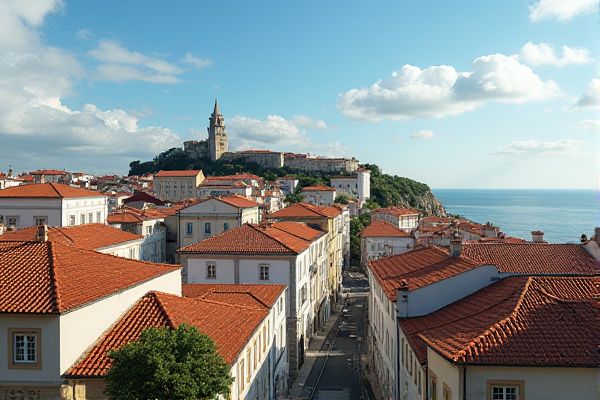
Safety and crime rates in Portugal: Low overall crime rate. Petty theft in tourist areas. Safe public transportation. Peaceful neighborhoods. Low violent crime incidents. 24-hour police presence. Emergency number: 112. Safe for solo travelers. Community watch programs. Police stations widely available.
Low overall crime rate.
Portugal is known for its low overall crime rate, ranking 7th among the World's Most Peaceful Countries, with violent crimes being notably infrequent. The most common crimes are theft, such as pickpocketing and bag snatching, particularly in tourist areas. For more detailed information on this topic, you can visit the comprehensive guide on the Global Citizen Solutions website.
Petty theft in tourist areas.
Petty theft, particularly pickpocketing, bag-snatching, and theft from motor vehicles, is a common issue in Portugal's tourist areas, especially in crowded locations like public transportation, train stations, and popular tourist attractions such as Tram 28, the Moorish Castle, and Pena Palace in Sintra. Thieves often use distraction techniques, and areas like Alfama, Bairro Alto, and train stations in Lisbon are particularly prone to these crimes. For more detailed information on this issue, visit the World Nomads website to learn about how to stay safe while traveling in Portugal.
Safe public transportation.
Public transportation in Portugal is considered safe, efficient, and user-friendly, boasting clean and reliable networks in cities like Lisbon and Porto. Efforts are continually made to enhance accessibility and safety for all users, ensuring a pleasant experience for both residents and visitors. These measures aim to provide an inclusive system that caters to the needs of everyone, facilitating seamless travel across urban areas.
Peaceful neighborhoods.
Portugal is known for its extremely safe and peaceful neighborhoods, with areas like the Azores, Madeira, Sintra, Lisbon, Porto, Aveiro, and Braga standing out for their low crime rates and high safety standards. These regions are characterized by their tranquility, low crime levels, and strong sense of security, making them ideal for residents and tourists alike. For more comprehensive insights, you can explore the detailed analysis on safety standards and crime rates by visiting Global Citizen Solutions, where Portugal's renowned safety is thoroughly examined.
Low violent crime incidents.
Portugal is known for its extremely low violent crime rates, ranking as one of the safest countries globally. With a homicide rate of just 0.9 per 100,000 people, and violent crimes being notably infrequent, the country contributes to an overall sense of safety for residents and tourists. To understand more about the security and peaceful environment of this beautiful nation, you can visit the Global Citizen Solutions website for detailed insights.
24-hour police presence.
The Public Security Police (PSP) in Portugal is actively enhancing its round-the-clock police presence in commercial zones as part of the "Comercio Seguro" program. This initiative is designed to prevent crime and offer protective measures for traders and commercial establishments. The increased vigilance aims to ensure safety and security during a busy season as it continues until December 21st. For more details on this reinforced security strategy, you can read about it in the article titled Increased Police Presence published by The Portugal News. This approach underscores a significant effort by the PSP to maintain order and peace in bustling commercial environments.
Emergency number: 112.
In Portugal, the emergency number 112 is available 24/7 and is free of charge, connecting callers to medical, fire, and police services. It is the primary number to call in any emergency situation, and operators can route the call to the appropriate service based on the nature of the emergency. For more detailed information, you can visit the website about Emergency Numbers in Portugal to ensure you are well-prepared in case of any unforeseen circumstances.
Safe for solo travelers.
Portugal is extremely safe for solo travelers, particularly solo female travelers, thanks to its low crime rates, excellent public transport, and friendly locals. While it is advised to take precautions against pickpocketing in crowded areas and to avoid quiet streets at night, the country is generally considered one of the safest in Europe. For more detailed insights on this topic, visit the TrustedHousesitters Blog for a comprehensive guide.
Community watch programs.
In Portugal, safety and community watch efforts are primarily driven by Safe Communities Portugal (SCP), a non-profit association that provides crime prevention and public safety information, and works closely with police and civil protection authorities to enhance community safety and disaster preparedness through volunteer-led initiatives and strong partnerships.
Police stations widely available.
In Lisbon, the police infrastructure is both extensive and well-structured, with the Lisbon Metropolitan Area being supervised by the PSP Lisbon Metropolitan Command. This entity oversees several specialized divisions, ensuring a robust presence across key districts, including the city's international airport and surrounding areas like Amadora, Loures, and Cascais. The government has recently announced an initiative focused on boosting police visibility through the establishment of "citizen police stations" in high-risk parts of the city. This plan is aimed at enhancing public safety and providing more accessible locations for residents to report crimes, including theft. For more detailed information on these efforts, visit the PSP Lisbon Metropolitan Command website.
